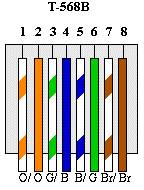When it comes to wiring RJ45 data jacks and plugs, ANSI, TIA and EIA agree on two wiring standards: T568A and T568B. While these standards are very similar and can oftentimes be chosen according to nothing more than the installer’s preference, there are a few significant differences between the two, and it’s very important to know about these before you begin to build – or expand – your network.
How are T568A and T568B similar?
The main similarity between T568A and T568B is that they both provide wiring schemes for terminating twisted-pair copper network cable (CAT cables) to 8-position RJ45 jacks and connectors. “8 position” refers to the fact that RJ45 data transmission requires 8 conductors, which are provided by the 4 twisted wire pairs found in the copper-based network cable we just mentioned. The pairs in this type of cable are based on four colors (blue, orange, green and brown), with each of pair consisting of solid-colored wire twisted together with another wire that’s of the same color, but striped with white. When untwisted, the 4 pairs result in 8 individual wires: one for each pin of the jack or plug.
What do the T568A and T568B wiring schemes look like?
 |
 |
What makes them different?
If you look closely at the two wiring diagrams shown above, you’ll see that the only difference (to the eye, at least) between T568A and T568B is that the pin positions for the green and orange pairs have been switched. But aside from the color reversals, there are a couple of compatibility factors that can affect your choice of an RJ45 wiring scheme.
Even though backward compatible with both one-pair and two-pair USOC wiring schemes, T568A has been largely superseded by the more up-to-date T568B. T568B and has become – overall – the most widely chosen wiring schematic because it matches AT&T’s old 258A color code, but at the same time accommodates for current and future needs. In addition, T568B offers backward compatibility with USOC, though for only one pair.
Can T568A and T568B be combined or interchanged? How do I know which one to use?
As a general rule, T568A and T568B should not be combined or interchanged. Keeping in mind that T568B is the preferred format for new networks, you’re (technically) free to choose either wiring scheme for cases in which a new network is being built from the ground up. But when an existing network infrastructure is being expanded upon, it’s vital that you find out (through either records or cable testing) which wiring schematic was originally used, and continue on within that standard.
Why is it so important that cabling updates and additions be made in accordance with the network’s original wiring standard? Continuity. It’s simple, really… if the wires don’t match up color-to-color and stripe-to-stripe when plugs and jacks are connected, data signals just won’t transfer.
There are rare instances when T568A-wired components need to be connected to T568B-wired components, and in these cases, a crossover cable (a patch cord that has an A-configured plug at one end, and a B-configured plug at the other) is used to smoothly transition between standards without compromising data.




